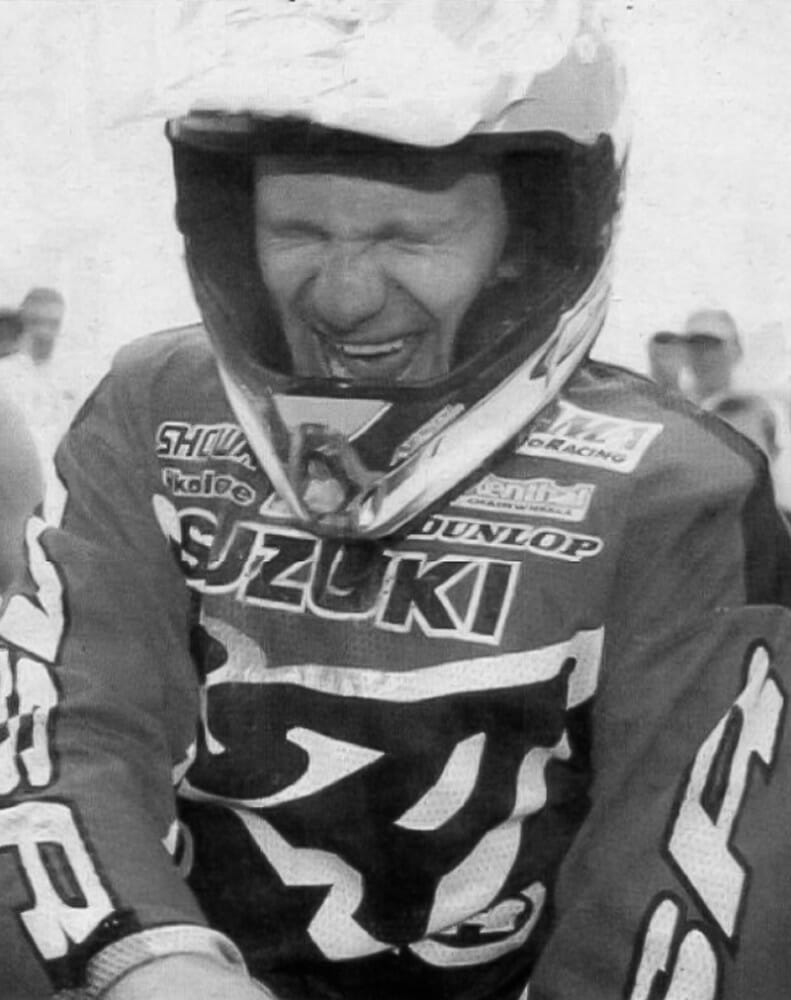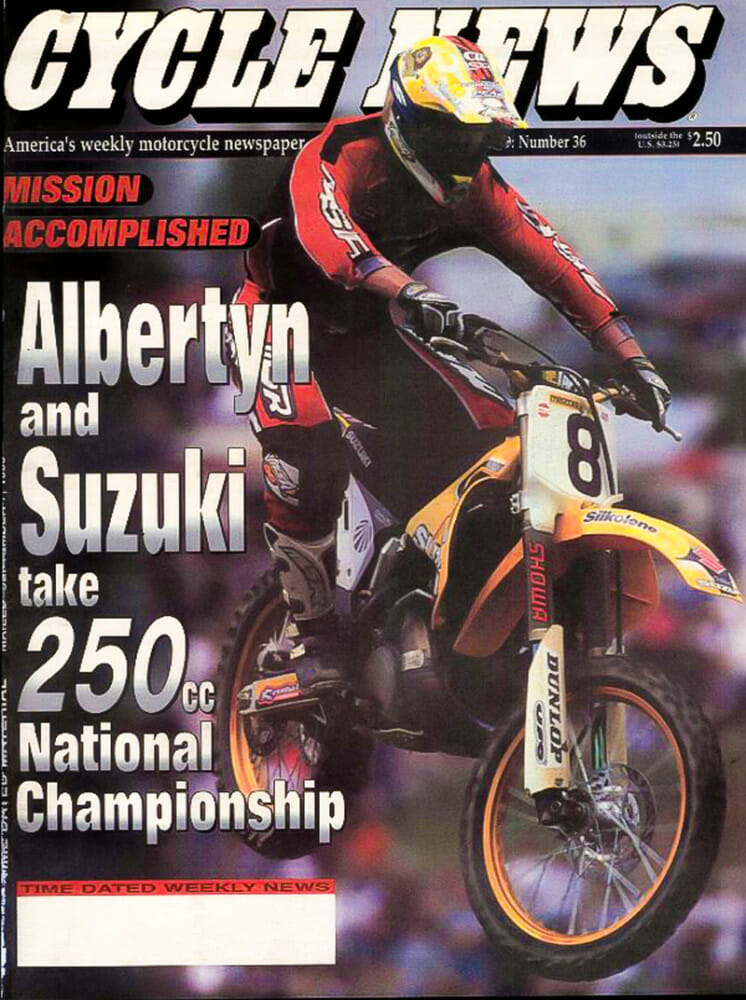Cycle News Staff | December 13, 2020
Cycle News Archives
COLUMN
This Cycle News Archives edition is reprinted from issue #7, September 21, 2005. CN has hundreds of past Archives columns in our files, too many destined to be archives themselves. So, to prevent that from happening, in the future, we will be revisiting past Archives articles while still planning to keep fresh ones coming down the road -Editor.
Turning Points
By Scott Rousseau
When Ricky Carmichael clinched the 2005 AMA 250cc National Motocross Championship in Delmont, Pennsylvania, it marked a turning point for Suzuki, as the brand claimed its first 250cc National MX title since 1999.
And that ’99 title marked a turning point for South Africa’s Greg Albertyn, who came to the United States in 1995 after having won three World Motocross Championship crowns. Before his quest for an AMA Championship was over, he would very nearly be out of the sport of motocross. Perseverance and a profound faith in God got Albertyn through some of the darkest days of his career, and when it was over, he reaped what he had sown.
“One of the qualities I admire in guys like Ricky [Carmichael] and [Jeremy] McGrath is how they are able to remotivate themselves year after year after year, racing the same championships,” Albertyn says. “For me, when I turned pro, I moved to Europe, and my first goal was the 125cc World Championship. I won that, and then I went up to the 250s and won two in a row. Then I felt like I needed a new challenge, a new goal, and that was to come over to the states and win [AMA] Supercross and motocross.”
 Greg Albertyn came a race away from quitting before he won his first AMA 250cc Motocross Championship in 1999.
Greg Albertyn came a race away from quitting before he won his first AMA 250cc Motocross Championship in 1999.
But Albertyn’s mettle was seriously tested in Supercross, as he crashed out at the series opener in 1995 and 1996, suffering the same injury both times. Each crash would adversely affect the season after it.
“I found out that I was allergic to Supercross,” Albertyn said. “Every time I rode it, I went to the hospital. I dislocated the same shoulder the same way. In 22 years of riding, I’ve never done that again.”
Albertyn now admits that those early mishaps may have been a result of being too big for his boots when he stepped on American shores. While he knew the competition was tough, he figured that he was tougher. But setback after setback began to corrode Albertyn’s iron will.
“The Lord was allowing me to be humbled, for sure,” Albertyn said. “Right after I’d won my third World Championship, I was leading the MX des Nations, and I hit a deer. Then, two weeks later, I broke my navicular; then I was riding for three weeks before I dislocated my shoulder in Orlando. Then, five weeks after that, I separated my other shoulder in Indy. Then I came back and broke my navicular again, and it didn’t heal, and I had to have surgery. Then I came back about two weeks before that Orlando race [in ’96] and dislocated my shoulder again. Then in San Diego, I tore the ligaments in my ankle. It was literally a year and a half of carnage. Every time I got on a bike—my whole career, I had never had injuries, and then I had all these injuries in the space of a year and a half. Pulling myself out of that downward spiral was one of the toughest things I’ve ever had to do.”
There were little victories to keep Albertyn going, such as his overall win at the Unadilla National in 1996, and a win at the Los Angeles Supercross in 1997, but Albertyn will admit that he wasn’t getting out of his time in America what he had put into it. The idea of quitting began to set in.
“It crossed my mind several times, but deep down inside of me—and it’s nothing that I choose to do—I’m a natural-born fighter,” Albertyn said. “One of the things I always said was that I was not retiring until I won a National Championship. That was not going to happen.”
Albertyn says that a turning point came at the end of 1998. “I had finished second in the Nationals to Doug Henry, and no discredit to Doug, but I really feel like I could have won that championship if he wasn’t on the 400,” Albertyn said. “He had a big advantage there, but for me, I felt that I was finally injury-free. I felt like [’99] was the time. I knew that I could win the National Championship, and I knew that if I was going to win it, this was going to be the year. I literally put more work and more commitment into that year than I had put into anything in my life.”
But, once again, things didn’t start off so rosy. At Glen Helen, Albertyn got caught in pileups and netted a disappointing eighth place overall. The following weekend at Hangtown, he was taken out in the first turn of moto two and suffered another setback, finishing sixth overall.
“I was already back to like fifth in the championship, and it was like, ‘This is it.’ I was up to my eyeballs in frustration. I sat down at Mount Morris, the third National of the year, I sat down with our chaplain, and I said, ‘I’ve done everything I can possibly do. I’m better prepared mentally and physically than I ever have been. What’s going on?’ He said to me, ‘Why don’t you tell the Lord that?’ So, I did. I got on my knees the night before the Mount Morris race and said, ‘Lord, Your word says that You will not push us beyond what we can endure. I am at that breaking point.’ ”
Albertyn says that if he hadn’t won that weekend, then he would have quit right then and there. Apparently, someone was listening. Instead of quitting, he swept both motos, claimed the overall and got himself right back in the championship chase.
“It was a major turning point,” Albertyn said. He would go on to win two more AMA National rounds that season, Millville and Steel City, and when he didn’t win, he almost won, just missing the overall at RedBud. Before it was over, Albertyn clawed his way back to win his first and only career AMA National 250cc National Motocross Championship.
 Albertyn celebrates his hard-earned AMA 250cc Motocross Championship at Delmont, Pennsylvania, in 1999.
Albertyn celebrates his hard-earned AMA 250cc Motocross Championship at Delmont, Pennsylvania, in 1999.
“It was such a deep satisfaction, but it wasn’t like the first championships I’d won,” Albertyn recalls of his feelings over winning the title. “When I won those, it was like, ‘Yes, I’ve finally broke through. I’m a World Champion. Nobody knew who I was, but that was what I had worked for ever since I was an amateur.’ When I won this time, it was like, ‘Thank you, Lord. I know that You had me come over for a reason.’ I had overcome the odds.”
Even with Ricky Carmichael’s much-heralded move to the 250cc class for 2000, Albertyn says that giving up or just taking it easy was not part of his mindset once he had the championship in hand, but in 2000 the injuries returned, and Albertyn made the difficult decision to retire at the end of that season. Afterward, he remained a part of the Suzuki organization for two years before moving on.
When reminded that he was the last man besides Carmichael to win the 250cc National Championship (in the two-stroke era), Albertyn said that he had forgotten that fact. Carmichael won the 250cc MX title from 2000 through 2006, the last championship coming when it changed to the 450cc class.
“That shows you how long Ricky has been dominating,” Albertyn says. “But I’m happy with my career. Over the 11 years that I raced, I won four titles, so that’s about a 35-percent success rate. When you’re talking the likes of Ricky, it’s actually pretty poor, but I have absolutely no regrets when I look back at my career. It’s the life values that you take away from it that are the most important. Ten years from now, nobody will remember who Greg Albertyn was.”
That’s debatable. Greg Albertyn will always go down in the record book as the last guy to win the AMA 250cc National Champion in the pre-Carmichael era, and that’s most definitely a turning point in the history of American motocross. CN